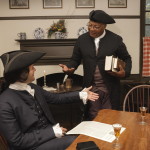Were the principles enshrined in the Declaration of Independence tarnished from the beginning?
That question is at the heart of this imagined conversation between Thomas Jefferson, the Declaration’s author, and Lydia Broadnax, an enslaved woman in the household of Jefferson’s mentor, George Wythe.
The conversation is not based on an actual event, although the two were acquainted. Instead, it seeks to capture two very different 18th-century perspectives.
Jefferson’s idealism is tempered by his awareness of the harsh realities of slavery. Although he wrote many times about the potential for slavery’s demise, he was a slaveowner from the age of 21 until his death.
Broadnax gained her freedom in 1787, but continued working for Wythe. She later became a property owner and lived until the 1820s.
Has the nation lived up to the promise of the Declaration of Independence?
Should knowing that political compromise was necessary for its passage make citizens more or less cynical about the possibility of working together today?


Cathy Hellier says
Kathie’s question is an excellent one. Even when looking at period evidence, it isn’t easy to come up with a definitive answer. Etiquette books written in the eighteenth century advise readers to “be courteous to the Servants, because they are your Inferiors” (The Polite Academy, 1768, p. 16) and “to behave to them with Civility” (Matthew Towle, The Young Gentleman and Lady’s Private Tutor, [1770], p. 103). On page 129, Towle advises young men: “Towards thy Inferiors shew much Humanity, and some Familiarity, as to bow the Body, stretch forth the Hand [to shake hands], and to uncover the Head [remove one’s hat, mark of polite respect].” Anecdotal evidence from Virginia indicates that some gentlemen returned a bow when an enslaved man bowed to them, but other gentlemen did not. So Thomas Jefferson might have risen when Lydia approached him, but perhaps not. On this point, the answer isn’t clear. Lydia probably would have curtsied to him as she approached, however.
Kathie Epler says
Yesterday I had the opportunity to see Katrinah Lewis and posed the same question to her. (She, for those who don’t know, portrays Lydia Broadnax). She said that since Mr. Jefferson would have been in the Wythe household and certainly knew Lydia, he more than likely would have risen when she entered the room.
Kathie Epler says
Great discussion between two historical figures. However, would the REAL Thomas Jefferson have stood when Lydia Broadnax entered the room? I think perhaps not. He would have looked upon her as a servant and remained seated, as the times dictated. Or am I just “projecting” what I’ve heard/read about the times?
Diane Phillips says
Thank you for sending me this link. This is a wonderful forum and as always, Colonial Williamsburg never backs away from subjects that make you think and makes you understand the reality of our beginnings. The length of the video is perfect and the additional biographical information provided leads to more investigation of the subject and persons portrayed. Thank you again for all you do.
I very much enjoyed this video. Mr. Jefferson tried on numerous occasions to set in motion the wheels that would bring about an end to slavery in America. It deeply distressed him when his original Declaration was altered. I think the thing we must remember is that, while we live in an age of fast food, lightening quick communication, and rapidly advancing technology, the world, for most of its history, has operated at a much slower pace. Slavery had been a part of the human condition for thousands of years, as had the subjugation of women. Mr. Jefferson could not - single-handedly or overnight - eradicate either condition, but his words echoed in the minds of the people and the generations to come.